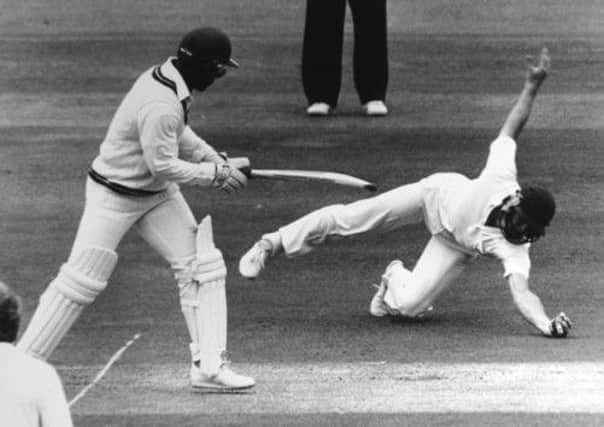Moxon has hand in testing great West Indies side before normal service is resumed by Logie


Four years earlier, the West Indies completed a 5-0 romp through England against a very poor team – the first whitewash in a five-Test series in this country.
There was, understandably, little belief in the England team that lined up against the same opponents four years later.
Advertisement
Hide AdAdvertisement
Hide AdBut, after drawing the opening Test at Trent Bridge – a result which ended a sequence of 10 straight losses to their opponents – there was a sense, even though bad weather had helped, that the hosts may indeed make a decent fight of it this time.
That belief was given added strength when the tourists found themselves going into lunch at 66-5 on a dull, overcast first day at Lord’s on Thursday, June 16.
The first wicket to fall was down to the quick reactions of a Yorkshireman. With the West Indies on 21-0, Yorkshire’s Martyn Moxon, called back into the England team in place of captain Mike Gatting – with John Emburey taking over leadership duties – leapt forward at short leg to cling on to a fine catch to dismiss Desmond Haynes off an inspired Graham Dilley.
Gordon Greenidge was next to go, caught behind by wicketkeeper Paul Downton off the Kent paceman, who also had Richie Richardson and the great Viv Richards caught, and Gladstone Small dismissed Carl Hooper at the other end.
Advertisement
Hide AdAdvertisement
Hide AdHowever, there was always a possibility with the West Indies team of that era that, should a handful of their batting stars fail, there would besomeone else on hand to take on the responsibility.
So it proved.
If Derek Pringle had held on to a chance from Gus Logie when the No 6 batsman was on just 10, it could well have been a different outcome for England.
But Logie knuckled down with wicketkeeper Jeffrey Dujon to pile on 130 for the sixth wicket. In a man-of-the-match performance, Logie went on to make an impressive 81 – 12 of his 14 fours came before he reached 50 – while Dujon put together a crucial 53. Another mini-collapse saw the last five wickets fall for just 25 runs, as the West Indies finished on 209.
“I was lucky to play two Test matches at Lord’s, one was my debut (against New Zealand) and the other was that Test against the West Indies,” recalled Moxon.
Advertisement
Hide AdAdvertisement
Hide Ad“The atmosphere was electric, particularly on the first morning against the West Indies when we had them in a bit of trouble – the place was packed, it was brilliant.
“I remember the catch well, it was their first wicket down. I also remember in the second innings when I was fielding at short leg for John Emburey and Viv Richards was in and stroking the ball all around – I had to take a lot of evasive action!”
England’s reply did not start well with Chris Broad going for nought with the score at 13.
Moxon then came to the crease and built a patient 45 with Graham Gooch before departing for 26 on the second morning, caught by Richards off Curtly Ambrose.
Advertisement
Hide AdAdvertisement
Hide AdOther than Gooch’s 44 and a cavalier 46 by David Gower, there was little else to write home about in the England batting, as they were dismissed for 165 before the end of the second day.
“They had such a great team back then, scoring was always difficult against their bowling attack because they were relentless and they never gave you anything,” added Moxon.
With clearer skies on the Saturday, it was the third day where the match was won and lost, the West Indies finding their feet to post 397 – Greenidge leading the way with a192-ball 103 and being ably supported by Richards (72) and Dujon (52), while Logie was unlucky to be denied a deserved century when he ran out of partners on 95.
When Patrick Patterson was last man out off the bowling of Paul Jarvis, England were left with a mountain to climb and the advantage they held on that first session the previous Thursday seemed a distant memory.
Advertisement
Hide AdAdvertisement
Hide AdAt 441 runs behind, they had to bat for 172 overs to save the match.
It seemed unlikely a fifth day would be needed.
But, thanks to a battling 113 from Allan Lamb and some solid support from the likes of Moxon – who stuck around for more than two hours for his 14 runs – together with some lower-order cameos, the game stretched into the final day.
After Lamb’s exit, there was an entertaining last-wicket partnership of 53 by Dilley and Jarvis before the visitors sealed a comprehensive 134-run victory.
The next three Tests all went the same way with the England selectors chopping and changing the line-up with alarming regularity in a desperate attempt to find a winning formula.
Advertisement
Hide AdAdvertisement
Hide AdMoxon remained for the third Test at Old Trafford, promoted to opener alongside Gooch at the expense of Broad, but he made a duck and 15 as England lost by an innings and 156 runs.
Unfortunately, Moxon did not get chance to play in front of his home crowd as he was dropped for the fourth Test at Headingley along with the recalled Gatting, the pair being replaced by Tim Curtis and former Yorkshire batsman Bill Athey.
England lost by 10 wickets in Leeds and Athey was swiftly replaced for the final Test at The Oval, which saw the West Indies stroll to another triumph, this time by eight wickets.
It would prove to be the last time ‘Calypso Cricket’ would dominate when touring England, the two subsequent tours ended in 2-2 draws before the balance of power officially shifted in England’s favour in 2000 when they won 3-1 – a first series win over the West Indies since 1969.